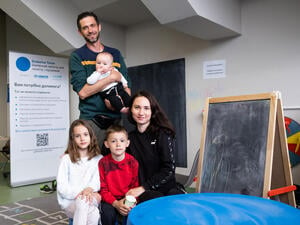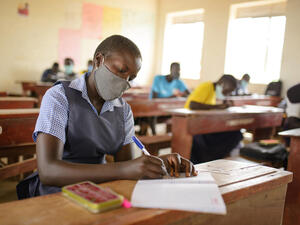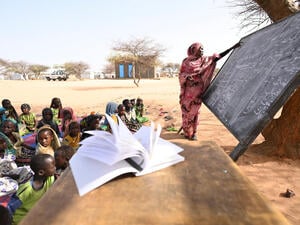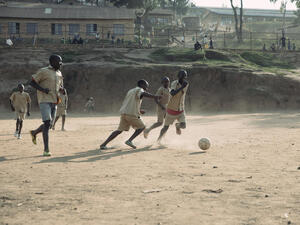UNHCR and UNICEF highlight unrelenting Children's Crisis
UNHCR and UNICEF highlight unrelenting Children's Crisis
NAIROBI, 15 December 2015 - The UN High Commissioner for Refugees (UNHCR) and the UN Children's Fund (UNICEF) warned today that the children of South Sudan remain some of the most vulnerable in the world. Noting the second anniversary since violence erupted in South Sudan, the two UN agencies called for all parties to uphold their commitments to the Peace Agreement, so as to allow the almost 1.5 million South Sudanese children to return home and receive an education, and child soldiers to be released and reintegrated.
Over the past two years, 1.65 million people have become internally displaced, and more than 650,000 South Sudanese have sought international protection as refugees in neighbouring Ethiopia, Kenya, Sudan, and Uganda. Without more global attention and support, an entire generation of children from the world's newest nation could be lost.
"Around two thirds of those who fled their homes and communities in South Sudan are children," said Leila Gharagozloo-Pakkala, UNICEF's Regional Director in Eastern and Southern Africa. "Respect for the Peace Agreement by all parties will enable children to reignite prospects and hopes for a dignified future."
In response to the situation, UNHCR, UNICEF and 14 child protection partners have together:
- established effective systems to support children, including training staff in child protection procedures in 85 per cent of registration points. This ensures adequate identification of the most vulnerable children.
- established 105 child-friendly spaces in refugee locations
- scaled up health care in refugee camps for malnourished children, providing medical and psycho-social support to child survivors of gender-based violence, vaccinating children against measles and polio, and ensuring children continue to receive some level of education.
Meanwhile, inside South Sudan, more than 459,000 people have been reached with life-saving supplies in remote locations. And more than 380,000 children were able to go back to school.
"Two years since the current crisis erupted, South Sudanese represent the largest refugee population in the region with nearly three quarters of a million people forced into neighboring countries," said Ann Encontre, UNHCR's Regional Refugee Coordinator for the South Sudan Emergency. "With most of those displaced being children, South Sudan cannot afford to have a generation of children lost, as in them lies the future and hope of the young nation."
Challenges remain in the response to the emergency, such as the unprecedented number of children who are internally displaced or refugees in neighboring countries; the exhaustion of community coping mechanisms; and weak national systems.
In South Sudan, children's needs for vital resources such as medicines, food, and shelter, far outweigh availability, and at least half a million children have had their education disrupted. Neighboring governments have generously opened their borders and provided access to available services, which, however, remain extremely limited or even inexistent in some settlement areas. In refugee locations, the enrolment rate for refugee children remains at a critically low 56%.
UNICEF and UNHCR are urgently calling on the global community for funds to provide shelter, education, health care, clean water, and other basic necessities for survival, as well as for the reintegration of children formerly in armed groups.
About UNICEF
UNICEF promotes the rights and wellbeing of every child, in everything we do. Together with our partners, we work in 190 countries and territories to translate that commitment into practical action, focusing special effort on reaching the most vulnerable and excluded children, to the benefit of all children, everywhere. For more information about UNICEF and its work visit www.unicef.org or follow UNICEF on Facebook and Twitter.
About UNHCR
The Office of the United Nations High Commissioner for Refugees was established on December 14, 1950 by the United Nations General Assembly. UNHCR is mandated to lead and co-ordinate international action to protect refugees and resolve refugee problems worldwide. Its primary purpose is to safeguard the rights and well-being of refugees, but also has a mandate to help people without nationalities. For more than six decades, UNHCR has helped tens of millions of people restart their lives. Today, a staff of some 9,700 people in 126 countries are helping some 60 million people. Learn more at www.unhcr.org and Facebook and Twitter.
For more information, please contact:
- UNICEF: James Elder, Regional Chief of Communication, Eastern & Southern Africa, Nairobi, Kenya, m: +254 71558 1222, e: [email protected]
- UNHCR: Teresa Ongaro, UNHCR spokesperson, m: +254 735 337 608, e: [email protected]








